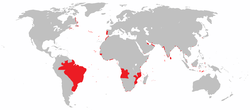Portuguese colony
| Portuguese Empire | |||||
| Império Português (Portuguese) | |||||
|
|||||
|
All areas of the world that were once part of the Portuguese Empire
|
|||||
| Capital | Lisbon | ||||
| Religion | Roman Catholicism | ||||
| Government | Colonialism | ||||
| Monarchs | |||||
| Presidents |
|
||||
| History | |||||
| • | Conquest of Ceuta | 1415 | |||
| • | Sea route to India | 1498 | |||
| • | Discovery of Brazil | 1500 | |||
| • |
|
||||
| • | Brazilian independence | 1822 | |||
| • |
|
||||
| • | Handover of Macau | 1999 | |||
| a. | ^ The capital was de facto located in Rio de Janeiro from 1808 to 1821. | ||||
| Warning: Value not specified for "" | |||||
The Portuguese Empire (Portuguese: Império Português), also known as the Portuguese Overseas (Ultramar Português) or the Portuguese Colonial Empire (Império Colonial Português), was one of the largest and longest-lived empires in world history and the first colonial empire of the Renaissance. It existed for almost six centuries from the capture of Ceuta in 1415 to the handover of Portuguese Macau to China in 1999.
The first era of the Portuguese empire originated at the beginning of the Age of Discovery. Initiated by the Kingdom of Portugal, it would eventually expand across the globe. Portuguese sailors began exploring the coast of Africa and the Atlantic archipelagos in 1418–19, using recent developments in navigation, cartography and maritime technology such as the caravel, in order that they might find a sea route to the source of the lucrative spice trade. In 1488, Bartolomeu Dias rounded the Cape of Good Hope, and in 1498, Vasco da Gama reached India. In 1500, either by an accidental landfall or by the crown's secret design, Pedro Álvares Cabral discovered Brazil on the South American coast.
Over the following decades, Portuguese sailors continued to explore the coasts and islands of East Asia, establishing forts and factories as they went. By 1571, a string of naval outposts connected Lisbon to Nagasaki along the coasts of Africa, the Middle East, India and South Asia. This commercial network and the colonial trade had a substantial positive impact on Portuguese economic growth (1500-1800), when it accounted for about a fifth of Portugal's per capita income.
...
Wikipedia


